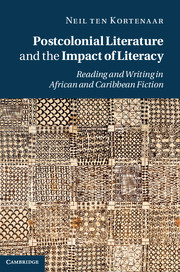 Postcolonial Literature and the Impact of Literacy
Postcolonial Literature and the Impact of Literacy Book contents
- Frontmatter
- Contents
- Acknowledgements
- 1 Introduction
- 2 The coming of literacy: Arrow of God by Chinua Achebe
- 3 The contents of the tin trunk: Ìsarà by Wole Soyinka
- 4 Mr Biswas finds a home in the world on paper: V. S. Naipaul
- 5 Literacy in the world not ruled by paper: Myal by Erna Brodber
- 6 Southern Africa's Houses of Hunger
- 7 Conclusion: the frontiers of writing
- Notes
- Bibliography
- Index
5 - Literacy in the world not ruled by paper: Myal by Erna Brodber
Published online by Cambridge University Press: 01 June 2011
- Frontmatter
- Contents
- Acknowledgements
- 1 Introduction
- 2 The coming of literacy: Arrow of God by Chinua Achebe
- 3 The contents of the tin trunk: Ìsarà by Wole Soyinka
- 4 Mr Biswas finds a home in the world on paper: V. S. Naipaul
- 5 Literacy in the world not ruled by paper: Myal by Erna Brodber
- 6 Southern Africa's Houses of Hunger
- 7 Conclusion: the frontiers of writing
- Notes
- Bibliography
- Index
Summary
Achebe, Soyinka, and Naipaul all write about a period before they were born in order to account for the presence of writing in their worlds and thus for their own existence as writers. The vantage point from which they look back implies writing's triumph. The story that novels tell of the coming of writing is teleological, even if, as in Achebe, the end is regarded with ambivalence and the beginning, the predominantly oral culture before literacy, is highly valued.
The Jamaican author Erna Brodber, however, retells the story of the coming of literacy from the point of view of an orality that is not eclipsed. Her 1988 novel Myal, set in a village outside Morant Bay in St Thomas Parish in the second decade of the twentieth century, depicts a great struggle between the spirit guardians of the community's health, associated with orality, and the demonic forces that threaten it, associated with print literacy. As so often, one of the terms in the pair orality and literacy supplies the frame that contains them both, but in Brodber's novel, orality is able to see around and know literacy as thoroughly as literacy always claims to know orality.
THE LETTER KILLS BUT THE SPIRIT SAVES
The second chapter of Myal begins with four stanzas from Kipling's poem ‘Big Steamers’, in which the ocean-going ships of the title explain to a child that they travel the world to bring him ‘beef, pork, and mutton, apples and cheese’.
- Type
- Chapter
- Information
- Postcolonial Literature and the Impact of LiteracyReading and Writing in African and Caribbean Fiction, pp. 135 - 162Publisher: Cambridge University PressPrint publication year: 2011


